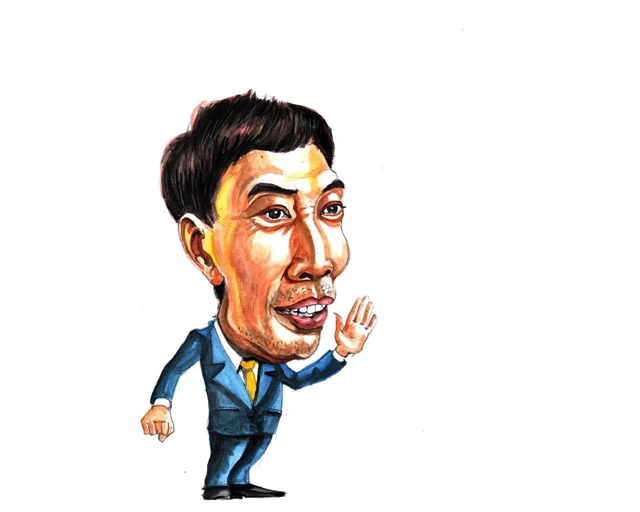From the early days of implementing the “Doi moi” (Renovation) policy in the late 1980s, the bigger hardships Vietnamese entrepreneurs encountered, the stronger they have become. We can see their strong, restless desire for making Viet Nam more powerful, prosperous and civilised.

From the early days of implementing the “Doi moi” (Renovation) policy in the late 1980s, the bigger hardships Vietnamese entrepreneurs encountered, the stronger they have become. We can see their strong, restless desire for making Viet Nam more powerful, prosperous and civilised.
Since the COVID-19 outbreak, entrepreneurs have talked a lot about challenges and risks and they are planning for a new business cycle in a “new normal” state despite the continued spread of the virus around the world.
However, the new normal is not just a COVID-19 story. Even before the pandemic appeared, the world was changing rapidly full of uncertainty and great risks but it also offered opportunities for those who had the guts to transform, innovate and grow.
It is a world where before making a decision and a reform, both Government and businesses must take into account a lot of stakeholders.
In the past 10 years, Viet Nam has faced a rising need for transformation, seeking a new growth model in line with the changing world. COVID-19 has broken value chains and made us apprehend this state more clearly and the new requirements of development.
Enterprises – which are the wings of the economy – understand the situation clearly, in terms of both positive and negative impacts. In the continued fight against the virus, they are still struggling with daily difficult decisions with reduced orders and insufficient cash flow.
Get back on track
Of course, the pandemic has forced a lot of enterprises to temporarily leave the market, even close down or dissolve, but the efforts to survive of a bigger part of the business and entrepreneurs are undeniable. Never before have I seen entrepreneurs’ aspiration to grow so clearly.
In October, nearly 8,300 enterprises quit the market, down 2.6 per cent year-on-year and down 9 per cent compared to September. Meanwhile, the number of newly-registered businesses increased 18.4 per cent against the previous month to more than 12,200 and the number of enterprises getting back on track rose 10.4 per cent to 5,044.
In the early stage when the new virus appeared, entrepreneurs and their businesses accompanied the Government in efforts to combat and prevent the disease and supported stabilising society.
Vietnamese businessmen have experienced difficulties, facing the matter of survival or disappearance in the past, so they have a strong desire to survive and thrive.
Since Viet Nam shrugged off the centrally planned economy in the late 1980s, Vietnamese entrepreneurs have had 3-4 generations of doing business. They have accompanied the country in the journey of economic reforms associated with the recognition of the private ownership, multi-sector economy, the role of entrepreneurs and the private sector in the economy.
They also experienced, succeeded or failed in the stage when the country opened up the economy to foreign investors and integrated into the world economy. Most importantly, they have learnt a lot.
Growing up in the war and subsidies and being forced to do business to escape poverty, the first generation of entrepreneurs witnessed the almost entire process of Viet Nam’s economic renovation. The second-generation chose business as a career. They were better trained with modern business thinking and more professional. The third generation of innovative start-ups is emerging with aspirations to demonstrate and prove themselves.
The 4.0 entrepreneurs understand the value of their businesses. They’re doing it for themselves, for the community and the country. They have big dreams and aspirations to help the nation catch up, go along and walk shoulder to shoulder with developed countries. Besides looking for profits, today’s businessmen are also seeking new ideas for sustainable, inclusive and innovative development.
Viet Nam’s economic growth has recognised the contribution of outstanding entrepreneurs such as FPT’s chairman Truong Gia Binh with the dream of using IT to push Viet Nam forward and keep pace with the world; Dang Le Nguyen Vu, founder and chairman of Trung Nguyen Group Corp, who wanted to “conquer” the world with the creative “spirit of coffee”; Ly Ngoc Minh who has brought Vietnamese ceramics reaching out to the world; and Mai Kieu Lien, Asia’s top 50 most powerful businesswomen four times, behind Vinamilk’s success.
Many Vietnamese entrepreneurs are now also among the top global “US$ billionaires” such as Vingroup’s chairman Pham Nhat Vuong and Vietjet’s president Nguyen Thi Phuong Thao. They have created strong enterprises that are capable of building large value chains and competing in the global market.
However, besides success, there are also stories of failure.
Some businessmen have failed to link their interests with those of the country and the community, lacking progressive ideas. There were also people who distorted the image of entrepreneurs with cronyism, seeking privilege and group benefits in doing business that makes society still sceptical about the rich or how to get rich.
Meanwhile, a number of businessmen followed short-termism, prioritising short-term results and lacking long-term and sustainable vision. They were unprofessional and not bold enough to go forward.
Many Vietnamese enterprises are in the process of transferring their business to the next generation. In this process, the key issue is not only transferring assets and wealth but more importantly is the transfer of values, aspirations for growing big that have made the success of the previous generations.
Vietnamese entrepreneurs have made great strides, but to compete in the global playing field, there are still many things for them to do.
In a world which lifestyles, consumption and technology are changing rapidly, the next generation must pay heed to essential aspects for growth such as embracing trends, innovation, connection, competition, understanding the outside and their own strength and knowing how to manage risks.
*Vo Tri Thanh is a senior economist at the Central Institute for Economic Management (CIEM) and a member of the National Financial and Monetary Policy Advisory Council. The holder of a doctorate in economics from the Australian National University, Thanh mainly undertakes research and provides consultation on issues related to macroeconomic policies, trade liberalisation and international economic integration. Other areas of interest include institutional reforms and financial systems.





